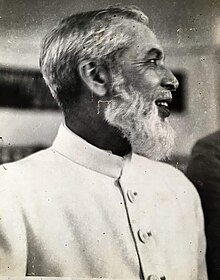Md. Hafizur Rahman | |
|---|---|
মো: হাফিজুর রহমান محمد حفیظ الرحمن | |
 Md. Hafizur Rahman, c. 1960 | |
| Minister of Finance and Planning of East Pakistan | |
| In office 29 May 1962 – 1965 | |
| President | Ayub Khan |
| Governor | List
|
| Preceded by | Position established |
| Succeeded by | Mirza Nurul Huda |
| Minister of Commerce of Pakistan | |
| In office 16 January 1960 – 28 May 1962 | |
| President | Ayub Khan |
| Preceded by | Zulfikar Ali Bhutto |
| Succeeded by | Abdul Qadir Sanjrani |
| Minister of Food and Agriculture of Pakistan | |
| In office 28 October 1958 – 16 January 1960 | |
| President | Ayub Khan |
| Preceded by | Mian Jaffer Shah |
| Succeeded by | Muhammad Azam Khan |
| Divisional Food Commissioner of East Pakistan | |
| In office 1957–1958 | |
| President | Iskandar Ali Mirza |
| Prime Minister | List
|
| Governor | A. K. Fazlul Huq |
| Joint Secretary Ministry of Food and Agriculture of Pakistan | |
| In office 1955–1957 | |
| Prime Minister | List
|
| Assistant Secretary Home (Defence) Department of Bengal Presidency | |
| In office 1942–1947 | |
| Prime Minister | List
|
| Governor | List
|
| Personal details | |
| Born | Mohammad Hafizur Rahman 26 January 1900 Kawrat, Noapara, Kendua, Mymensingh district, Bengal Presidency (Now, Netrokona District, Bangladesh) |
| Died | 15 May 1984 (aged 84) Dhaka, Bangladesh |
| Nationality |
|
| Children | Husne Alam (Professor of English) Anisur Rahman Husne Ara Kamal (Professor of Social Welfare) Akhter Jahan Rahman (Clinical Psychologist) Amin Rahman (Applied Linguist) Nazni Farooq(IT Specialist |
| Relatives | Mustafa Kamal (son-in-Law) Nashid Kamal (granddaughter) Armeen Musa (great granddaughter) |
| Alma mater | University of Dhaka (BA, MA) |
| Occupation | university lecturer, civil servant, minister, |
| Awards | |
Mohammad Hafizur Rahman[a] SQA (Bengali: মোহাম্মদ হাফিজুর রহমান, Urdu: محمد حفیظ الرحمن; 2 June 1902[b]– 15 May 1984), known as Md. Hafizur Rahman (মো: হাফিজুর রহমান), was a senior civil servant and minister, whose career spanned British colonial India, Pakistan, and Bangladesh. Born into a Bengali Muslim family in British India, Hafizur Rahman rose from a village boy in Mymensingh to prominent positions of authority. He excelled academically, securing scholarships and graduating with honors in Economics from the University of Dhaka.[1][2][3][4]
Starting as an assistant lecturer at Dhaka University, Hafizur Rahman later joined the Bengal Civil Service, holding various administrative positions and progressing to roles such as assistant secretary, joint secretary, and director in multiple government departments.[2][1][3][4]
With the establishment of Pakistan in 1947, Hafizur Rahman rose in rank and became part of the Civil Service of Pakistan. He served in crucial positions, such as Chief Controller of Jute Regulations and District Magistrate, actively representing Pakistan's interests on the global stage in various roles like the Joint Secretary in the departments of food and agriculture.
In the wake of Ayub Khan's rise to power, Hafizur Rahman was appointed as the Minister of Food and Agriculture in 1958[5] in the central cabinet and later as the Minister of Commerce in 1960.[6] He led Pakistan's delegation to international conferences, seeking global cooperation, and emphasized the urgent need for economic parity between East Pakistan and West Pakistan. After long-standing disagreements with Ayub Khan and the introduction of the new Constitution of Pakistan allowing for provincial governments in 1962, he resigned from his federal posts and moved to East Pakistan, becoming the Provincial Minister of Finance and Planning[7][3] until his retirement in 1965.[8]
After retiring from politics, Hafizur Rahman remained involved in economic development initiatives in underprivileged areas of East Pakistan.[9] After Bangladesh emerged as a new state, Hafizur Rahman continued to contribute to the development of the country's post-war broken economy by taking senior roles asn chairman. advisers and directors of different government and commercial organisations,
His legacy was defined by his pursuit of development and progress for East Pakistan and later Bangladesh. Advocating for provincial autonomy and separate industrial units in the region, Hafizur Rahman's efforts laid the groundwork for the formulation of the six-point demands, which carried significant implications for Pakistan's future.[10][11][12]
Cite error: There are <ref group=lower-alpha> tags or {{efn}} templates on this page, but the references will not show without a {{reflist|group=lower-alpha}} template or {{notelist}} template (see the help page).
- ^ a b Cite error: The named reference
bio 3was invoked but never defined (see the help page). - ^ a b Cite error: The named reference
bio 2was invoked but never defined (see the help page). - ^ a b c Cite error: The named reference
bio 1was invoked but never defined (see the help page). - ^ a b Cite error: The named reference
bio 4was invoked but never defined (see the help page). - ^ Cite error: The named reference
:0was invoked but never defined (see the help page). - ^ Cite error: The named reference
:1was invoked but never defined (see the help page). - ^ Cite error: The named reference
:2was invoked but never defined (see the help page). - ^ Cite error: The named reference
:3was invoked but never defined (see the help page). - ^ Cite error: The named reference
:4was invoked but never defined (see the help page). - ^ Cite error: The named reference
onewas invoked but never defined (see the help page). - ^ Cite error: The named reference
threewas invoked but never defined (see the help page). - ^ Cite error: The named reference
twowas invoked but never defined (see the help page).